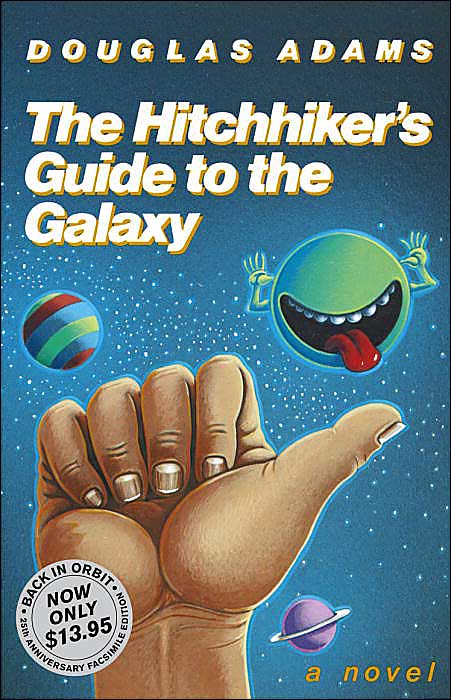Book RePORT: The Hitchhiker’s Guide to the Galaxy
October 28, 2018
The Hitchhiker’s Guide to the Galaxy series by Douglas Adams has been around for many years, spanning 5 books, a radio series, a 3 issue miniseries from DC comics, a TV series, and even a major motion picture. But as the series turns 40, let’s go and look back at the first book in the series.
The story begins as the fairly average Arthur Dent wakes up to find bulldozers outside preparing to demolish his house to make way for a bypass. Lying in front of the construction vehicles, his friend Ford Prefect comes by, taking Arthur to a bar and informing him that he is an alien who has been stranded on Earth for 15 years. He is reporting for the electronic database in a handheld form that is the Hitchhiker’s Guide to the Galaxy. His Sub-Etha Sens-o-Matic has detected the approach of a Vogon destructor fleet, which plans to destroy the Earth to make way for a hyperspace bypass. Arthur’s house is demolished, but then the Vogons arrive. Arthur and Ford narrowly escape, getting picked up by the Vogon ship’s cooking staff. The Vogons, great ugly slug-like bureaucrats, are not particularly happy to see them, and the ship’s captain, Prostetnic Vogon Jeltz, reads them the third worst poetry in the universe, and the pair are then thrown into the vacuum of space.
Miraculously, Arthur and Ford are picked up by the Heart of Gold. This advanced spaceship is powered by the infinite improbability drive. It has been commandeered by the two-headed, three armed, narcissistic former President of the Universe Zaphod Beeblebrox, a human woman named Trillian, and a perpetually desponded robot named Marvin. Zaphod turns out to be an old friend of Ford’s, and Arthur originally met Trillian at a party, when she was going by her original name Tricia McMillan, when Zaphod came by and invited her to join him. All of this is thanks to the infinite improbability drive, which Zaphod is counting on to get to the legendary planet of Magrathea.
The story moves along at a brisk pace, but will occasionally slow down to tell a hilarious anecdote which will sometimes have bearing on the story. The jokes all hit their mark, and the author excels at humor through both dialogue and exposition. The book revels in its own absurdity, throwing technobabble like Sub-Etha Sens-O-Matic and finite improbability down our throats with glee. The characters are all interesting and/or funny. Everything just works flawlessly.


